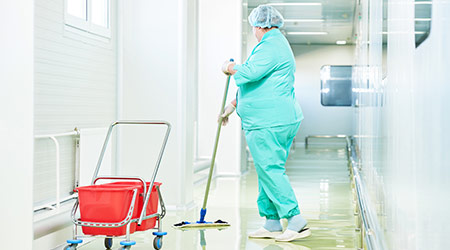
Disinfectants may be helping create superbugs
Research has led to calls for the products - Chlorhexidine and Mupirocin - to be more strictly regulated
Doctors have called for common hospital disinfectants to be regulated like antibiotics after studies suggest that the chemicals are helping create resistant superbugs, according to an article on The Herald website.
The researchers at Scotland's University of Aberdeen say that as many as 10 to 15 patients a month — in an average intensive care ward — are contracting infections linked to the overuse of disinfectants.
This has led to calls for the products - Chlorhexidine and Mupirocin - to be more strictly regulated.
The results suggest that healthcare facilities need to change the way they think about using disinfectants, particularly in the hospital setting. The research showed that in environments with a high concentration of disinfectant, previously harmless staphylococcus epidermidis bacteria can develop resistance to treatments commonly used to treat infection.
Despite the concerns over the use of the disinfectants, the researchers stops short of calling for hospitals to ban them.
March 25, 2019
Recent Posts
 Design Plays a Role in the Future of Healthcare
Design Plays a Role in the Future of Healthcare
With no healthcare facilities popping up, designers need to create spaces that will stand the test of time.
 Cedar Hill Regional Medical Center GW Health Officially Opens
Cedar Hill Regional Medical Center GW Health Officially Opens
It is the first freestanding, full-service hospital to be constructed in Washington, D.C., in over 25 years.
 Designing Healthcare Facilities for Pediatric and Geriatric Populations
Designing Healthcare Facilities for Pediatric and Geriatric Populations
Understanding the nuanced needs of both age groups is essential to creating supportive multi-generational environments.
 Kaiser Permanente Announces New Hospital Tower at Sunnyside Medical Center
Kaiser Permanente Announces New Hospital Tower at Sunnyside Medical Center
It plans to open this new facility on the campus in 2029.
 Building Disaster Resilience Through Collaboration
Building Disaster Resilience Through Collaboration
The ability to respond quickly and recover effectively depends on the strength of an organization’s external bonds.